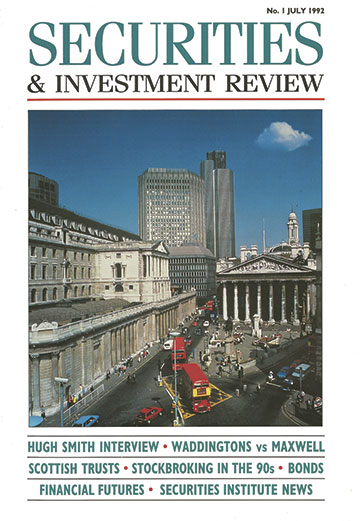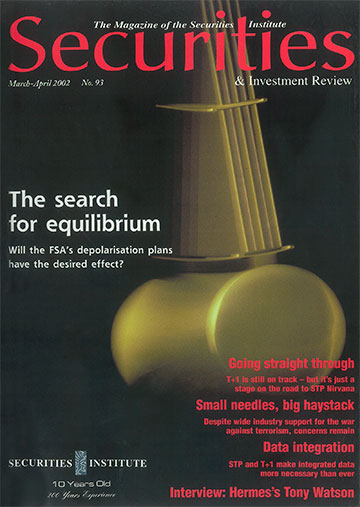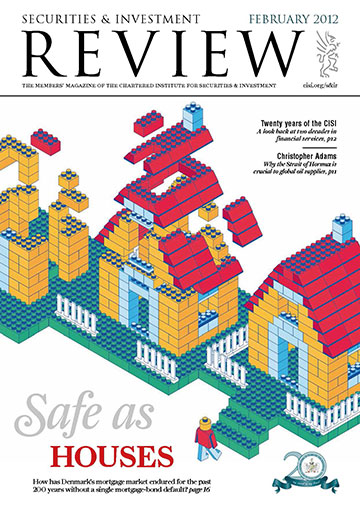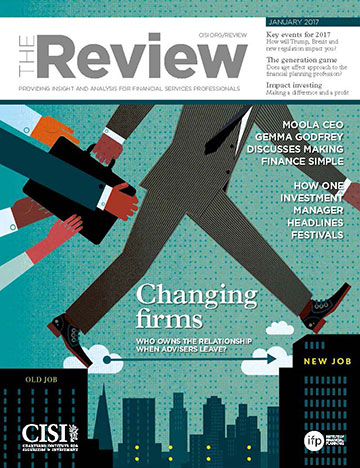While it is true that a quarter of a century is a long time – 1992 was the era of Black Wednesday and Robert Maxwell, after all – the fact is that although some things change quite drastically, some most certainly remain constant.
Take the regulation of financial services and capital markets: successive governments and regulators often arrive with grand plans to streamline and level the regulatory playing field, but very few manage to introduce new rules without at least some fallout from the law of unintended consequences.

Over its 25-year lifespan,
The Review has been a frontline observer of this, treading a fine line between steadfast belief in the need for effective regulation, while maintaining a healthy scepticism of the possible effects of each new rule.
Rules of the gameFor instance, the October 1999 edition’s Comment page, titled '
Individual responsibilities', responds to the FSA’s (the regulator at the time) proposed approved person test: “We urge the FSA to ensure that the enhanced ‘Approval of individuals’ regime is not imposed so rigidly as to be buried under its own complexity.”
By September 2005,
The Review is concerned that the test, now established, will allow errant individuals to flourish, with the regular column, View from the Monument, '
Removing reassurance', noting: “The proposal to end compulsory examinations removes the reassurance that basic knowledge has been tested thoroughly in new recruits.”
The campaign to remove stamp duty, a central theme when the Institute launched, was less successful. This was despite
The Review calling on the UK to eradicate the duty in the June 1999 Comment page, titled ‘
Stamp out stamp duty’, because it represents a hindrance to trade and threatens UK dominance of European markets. It remains stubbornly in place.
Fair gameMeanwhile, other concerning issues were arising: the July/August 1999 edition features a landmark piece on women in the City, titled ‘
City limits’. Citing a
Reuters survey highlighting sexual discrimination, inflexible working, boorish behaviour, a lack of promotion prospects, the pay gap, a lack of women in senior positions – only one in 25 directorships –
The Review’s coverage of the issue recognises the beginning of a new era of equality, albeit a slow-moving one.
The issue comes up again in March/April 2005, but by now the tone is notably different. Those interviewed for the feature ‘
Sexism and the City?’ place far more emphasis on how women are taking control of their careers, standing up for better treatment and demanding equal pay and working conditions.
The magazine has encouraged and celebrated the paradigm shift in the profile and prominence of women in the sector. Indeed, the
September 2016 edition features 13 women quoted in articles or writing columns, in comparison to the
July 1992 launch issue, which features just the one – Clare Gore Langton is pictured as the sole woman in a board of 11 directors.
Rise of the machinesThe issue of technology has become central to the efficient functioning of markets, and has had a transformative effect on the sector. In January 2006,
The Review features a cover story titled ‘
The end of traders?’ questioning whether advances in technology would spell the end of the trader.

“The front office role is changing and becoming much more sophisticated”, says one observer, “automatic trading does everything the trader did, but doesn’t need to use the toilet”.
While most institutions still have toilets, the prediction that in fact the smartest people in the room would migrate from trading to IT strategy and design, and focus more on infrastructure, has proved to be prophetic.
Indeed, as far back as 2007,
The Review warns of the inherent dangers in the cyber spheres, calling for serious investment in IT security measures. In the April edition, the feature ‘
Access all areas’ notes that firms that fail to do so are likely to be damaged through “fines and loss of reputation”.
Paying the piper
Even a cursory glance through
The Review archives reveals a consistency of vision. Take executive pay: City View in
November/December 2011, titled 'Taking responsibility', states: “The scale of remuneration within the City remains the millstone around the reputational neck of the industry.”
This issue of trust and integrity runs through 25 years of columns:
March/April 2002 sees the publication of
The Review’s tenth anniversary edition. In View from the Monument, 'Looking back', Graham Ross Russell FCSI(Hon), the Institute’s first member and its first chairman (1992–2000), looks back on its first decade of life and heralds the expansion of membership to 17,000, as well as the establishment of a range of qualifications and training. However, “we cannot rest on our achievements”, Graham writes. “Standards in our industry must continue to rise.”
These comments are echoed by his successor, Scott Dobbie FCSI(Hon), who was chairman of the Institute from 2000 to 2009. In 'Looking forward' Scott says that the following decade will be marked by more challenges to the industry – not least in the area of maintaining professional standards. “Increasing product and geographical complexity has increased pressures on individuals and their managements,” he says. “We believe that creating and sustaining a strong ethical culture will be a major factor in avoiding the reputational risks inherent in our increasingly complex businesses.” That commitment was to be sorely tested in the years ahead.
The gathering storm
The test came in the form of the global financial crisis, perhaps the single most shattering event of the Institute’s lifetime. As 2007 ticked into 2008,
The Review reminds members that ethics and good management will go a long way towards protecting the City from any shocks. The November 2007 View from the Monument, '
Laying the foundations', states: “An industry in which individuals, firms and regulators each have a common and clear values system, built on sound ethical cornerstones of honesty, openness, fairness and transparency, can only enhance the reputation of the industry.”

The signs were there, if those in the industry wanted to see them. Furthermore, there is no doubt that the public saw countless articles criticising ratings agencies after the crisis, but not many before. So the advice from Martin Fagan in ‘
All that glisters’ in the April 2008 edition to “never rely on credit rating agencies (CRAs) alone” has proven to be somewhat sage.
Indeed, the prophetic final line of the piece mourns the refusal of markets and regulators to address the glaring flaws in the CRA model: “To paraphrase Warren Buffett, most debt analysts look at the rear view mirror and not through the windscreen.”
In fact, the July/August 2008 issue, just before the global financial crisis hit, offers a poignant lament from long-serving columnist Anthony Hilton, who writes in View from the Monument, '
Cats who won't get the cream', shortly before the collapse of Lehmans: “I despair of ever getting banks to realise that incentivising staff to do deals, make loans and expand the balance sheet regardless of quality is asking for trouble …”
Picking up the pieces
Indeed, as the November/December 2011
City View reminds members: “We must remain aware of our individual responsibilities: to act with integrity, both individually and corporately, and to encourage one another to achieve the same high standards in our personal and professional dealings with others as we expect in their dealings with us.”
In the immediate aftermath of the global financial crisis, strategic consultant and business thinker Rohit Talwar argues for root and branch reform to the global financial system in general, and banking in particular. In ‘
2012: A financial odyssey’, from the November/December 2008 edition, he calls for everything from closing the markets for three months to requiring top executives at the worst run banks to reconnect to reality by carrying out community service. He signs off with the thought that ignoring the causes and adopting a business-as-usual approach simply would not do.
“We let the alcoholics run the bars, we extended the opening hours and the only health check we applied was to ask if they were drinking enough. Restocking the bars doesn’t seem like an option,” Rohit says.
Precise predictions
Many times
The Review has found itself taking some less than popular stances that have proven to be unusually prescient. For instance, in
September 2013, City View, titled 'Too many debits for credit unions', points out that instead of targeting payday lenders for their usurious interest rates, the Archbishop of Canterbury should be focusing his ire on the banks and their overdraft fees, which represent more of a scandal.

That view has since been vindicated, with the issue even reaching the Treasury Select Committee in 2016, with chair Andrew Tyrie suggesting, “Consumers need to know what they are being charged for their bank accounts, especially their overdrafts. At the moment they often struggle to find out.” In response, the CMA is now considering capping overdraft fees as part of its banking reforms. With the wider financial press taking three more years to pick up on this issue, once again the CISI was out in front of the pack.
And the work to instill integrity and protect those who speak up for it continues. While they may not be on the books yet, statutes are in the pipeline to recompense those who speak out against misconduct, as well as provide a greater focus on integrity and trust.
Changing with the times
In
February 2012,
The Review’s 20th anniversary edition reflects on the first, bruising decade of the 21st century. It was a decade that left its mark on the Institute, which had by then become the largest professional body for those working in the securities and investment industry.
For Scott, as noted in ‘From back room to world force’, the crowning achievement was attaining Chartered status in 2009, “providing a base for my successor to meet the challenges and opportunities in the coming years, including the FSA’s Retail Distribution Review.”
Articles like this show that, throughout its quarter century
The Review has demonstrated an understanding of the hidden dynamics of the market as well as in-depth knowledge of the sector – qualities necessary to remain relevant and vital in a volatile and dynamic industry.